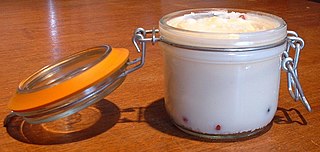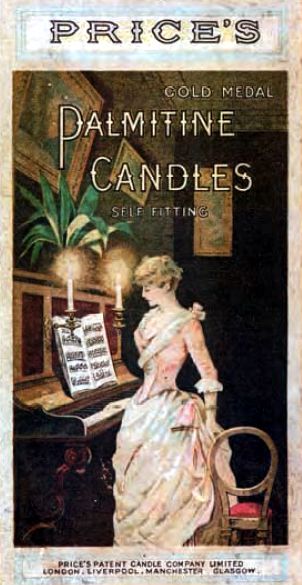A lubricant is a substance that helps to reduce friction between surfaces in mutual contact, which ultimately reduces the heat generated when the surfaces move. It may also have the function of transmitting forces, transporting foreign particles, or heating or cooling the surfaces. The property of reducing friction is known as lubricity.

Soap is a salt of a fatty acid used in a variety of cleansing and lubricating products. In a domestic setting, soaps are surfactants usually used for washing, bathing, and other types of housekeeping. In industrial settings, soaps are used as thickeners, components of some lubricants, and precursors to catalysts.

Tallow is a rendered form of beef or mutton suet, primarily made up of triglycerides.

Stearic acid is a saturated fatty acid with an 18-carbon chain. The IUPAC name is octadecanoic acid. It is a soft waxy solid with the formula CH3(CH2)16CO2H. The triglyceride derived from three molecules of stearic acid is called stearin. Stearic acid is a prevalent fatty-acid in nature, found in many animal and vegetable fats, but is usually higher in animal fat than vegetable fat. It has a melting point of 69.4 °C (156.9 °F) °C and a pKa of 4.50.

Synthetic oil is a lubricant consisting of chemical compounds that are artificially modified or synthesised. Synthetic lubricants can be manufactured using chemically modified petroleum components rather than whole crude oil, but can also be synthesized from other raw materials. The base material, however, is still overwhelmingly crude oil that is distilled and then modified physically and chemically. The actual synthesis process and composition of additives is generally a commercial trade secret and will vary among producers.
Timken OK Load is a standardized measurement that indicates the possible performance of extreme pressure (EP) additives in a lubricating grease or oil. The units of measurement are pounds-force or kilograms-force. This measurement is performed using a special test machine and standard block and ring test specimens.

Petroleum products are materials derived from crude oil (petroleum) as it is processed in oil refineries. Unlike petrochemicals, which are a collection of well-defined usually pure organic compounds, petroleum products are complex mixtures. Most petroleum is converted into petroleum products, which include several classes of fuels.

AMSOIL Inc. is an American corporation based in Superior, Wisconsin that primarily formulates and packages synthetic lubricants, fuel additives, and filters. Company founder Albert J. Amatuzio developed several synthetic motor oil formulations throughout the mid-to-late 1960s. He was commercially selling synthetic motor oil by 1968. In 1972, AMSOIL 10W-40 Synthetic Motor Oil became the world's first synthetic motor oil to meet American Petroleum Institute requirements, which prompted the company to adopt "The First in Synthetics®" as its tagline. The company introduced several other synthetic lubricants that represented industry firsts throughout the 1970s and early 1980s. It distributes products in North America via a network of independent dealers paid commissions on sales.
Calumet Specialty Products Partners, L.P. is a publicly traded U.S.-based company that was incorporated in 1919. It specializes in the manufacture of lubricating oils, solvents, waxes, packaged and synthetic specialty products, fuels and fuel-related products. The company operates 12 production, blending, and packaging facilities across North America. This includes locations in Princeton, Cotton Valley, and Shreveport, Louisiana; Burnham, Illinois; Dickinson, Texas; Muncie, Indiana; Karns City, Pennsylvania; and Great Falls, Montana. Calumet's specialized hydrocarbon products are distributed around the world to approximately 2,700 global customers.

Mobil 1 is a brand of synthetic motor oil and other automotive lubrication products. Originally developed by the Mobil oil company, it is now globally marketed and sold by ExxonMobil.
Grease is a solid or semisolid lubricant formed as a dispersion of thickening agents in a liquid lubricant. Grease generally consists of a soap emulsified with mineral or vegetable oil.

Price's Candles, founded in 1830, is an importer and retailer of candles. The firm is headquartered in Bedford, England, and holds the royal warrant of appointment for the supply of candles. It is one of the largest candle suppliers in the United Kingdom.

Lincoln Industrial Corporation (Lincoln) is a manufacturer of automated lubrication systems, manual lubrication equipment and industrial pumping systems, and subsidiary of Svenska Kullagerfabriken AB (SKF). Founded in 1910, the company has been responsible for many of the inventions that established modern lubrication practices in automotive maintenance and industry.
Dry lubricants or solid lubricants are materials that, despite being in the solid phase, are able to reduce friction between two surfaces sliding against each other without the need for a liquid oil medium.

Automatic lubrication systems (ALS), also occasionally called centralized lubrication systems (CLS), are devices that deliver controlled amounts of lubricant to multiple locations in a machine as it is operating. While these systems are usually fully automated, systems that require manual pump or button activation are still identified as centralized lubrication systems. These systems can be classified into two different categories. These are Oil systems that are primarily used for stationary equipment, such as CNC mills, and Grease systems which are mainly used on mobile equipment such as trucks, mining and construction equipment.

Nye Lubricants, Inc. is a manufacturer of industrial lubricants. It formulates, manufactures, and sells synthetic lubricants, thermal coupling compounds, index-matching optical gels, and fluids. Nye supplies the automotive, computer printer, disc drive, mobile appliance, aerospace, defense, and HB-LED OEM markets. The company also manufactures industrial maintenance lubricants for incidental food contact, high temperature, and other extreme environments.

The Petromin Corporation is a Saudi Arabian lubricants and automotive services company, operating in lubricant oils including manufacturer, industrial, and automotive oils and lubricants, car servicing, fuel retailing and car dealerships. The company is one of the "Major Leading Players" of the lubricating grease Industry.

Behran Oil Company is an oil refining company with headquarters in Tehran. Its products are exported to more than 40 countries.
Afton Chemical Corporation develops and manufactures petroleum additives, including driveline, engine oil, fuel and industrial additives. Afton Chemical Corporation is headquartered in Richmond, Virginia, and has operations around the world. The company is a subsidiary of NewMarket Corporation, a corporation specializing in performance specialty chemicals.
Nicholas Schaeffer (1814-1880) was an American industrialist. He is noted as one of the founders of the American company, Schaeffer Oil. He was also known as the one of the largest and most prosperous soap manufacturers in the West during his time.













